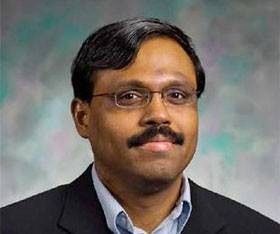Ranjit Koodali, Ph.D.

Ranjit Koodali
Associate Professor of Chemistry and Graduate Program Director
University of South Dakota
B.S., Chemistry, Physics, Mathematics, Loyola College, Madras (Chennai), India
M.S., Chemistry, and Ph.D., Photocatalysis, Indian Institute of Technology, Madras
He earned his Ph.D. in chemistry in India, completed his first post-doctoral fellowship at the Hebrew University of Jerusalem, his second at the University of Houston, and now holds an associate professor position at the University of South Dakota. His life as an academician is busy with teaching responsibilities, committee work, and spending time talking with and encouraging his students.
Though his professorial duties are demanding, ACS has contributed greatly to his professional fulfillment. “ACS membership opens doors to new opportunities for professional guidance and growth,” he says. “I have immensely benefited from my active participation in the Sioux Valley Local Section and the ACS Energy and Fuels Division.”
Today, Koodali is an officer in the ACS Energy and Fuels Division. His current research work relates to the application of nanomaterials for environmental remediation and clean energy. His areas of research encompass synthesis and characterization of nanomaterials and their applications towards photochemical storage and conversion of solar energy.
Give your best and do not be bothered by the results of your actions.
Typical day on the job:
No two days of my academic career have been the same. I seem to have the best job in the world interacting with diverse and talented people and enjoying my work! At The University of South Dakota where I am employed currently, my duties are teaching, research, and service. I typically teach 3 times a week and in addition have a laboratory session (3 to 4 hours) each week to supervise. I typically manage a group of ten that includes 1 Post-Doc, 5 graduate students, and 4 undergraduate students. I also serve as the Graduate Program Director for the Chemistry Department and in this capacity work closely with the Chair of Chemistry and the Dean of the Graduate School and other personnel across the campus such as International Student Services.
In addition to these, I serve on various committees in the University such as Curriculum and Instruction Committee, Scholarship Committee, University Research Council etc. Because I am involved in several projects funded by the National Science Foundation, U.S. Department of Energy, NASA, etc., I do have to submit reports to the relevant personnel. I write grants and papers, and review manuscripts; grant proposals also take considerable time. Finally, I love to visit with prospective students and showcase the University and the Department and make them realize how a strong education is required for a successful career.
Work environment:
I work mostly from my office, but visit with colleagues and other staff to respond to their questions and exchange pleasantries. In my work space are computers, and printers and plenty of books! There is no coffee machine in my office!!
Work schedule:
In a typical week (if there is one at all!), I work at least 60 hours. There are some weeks where the pace is hectic just because of the deadlines. Summers are usually more relaxed if one can bear the heat and humidity!
Tools you can’t live without:
I cannot plan any day (including my weekends!) without my Outlook Calendar!
Best productivity trick:
The best trick is to take a break each hour, remain hydrated, and not to be distracted by the constant flow of e-mails.
Best career advice you’ve received:
The best advice that I received was from my Dad: Give your best and do not be bothered by the results of your actions.
Skills or talents that make you a good fit for your job:
My abilities to persevere, remain diligent, pay attention to details, be highly organized, and conscientious, are traits that have helped me be successful.
Essential habit you wish you’d started earlier:
Perseverance at the start of my career would have helped me.
Favorite ACS resource:
The ACS journals and Chemical & Engineering News allow me to keep me updated of the latest research. Of course, the ACS website is a wonderful resource with rich information.

